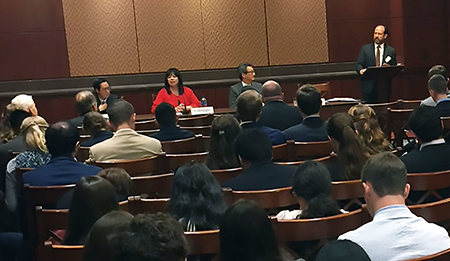"Though we have acheived progress, our work is not over. That is why I support the mission of the Arms Control Association. It is, quite simply, the most effective and important organization working in the field today."
Events and Remarks
 Staff and experts with the Arms Control Association periodically host or participate in events to inform policymakers, journalists, and the public about important developments in arms control.
Staff and experts with the Arms Control Association periodically host or participate in events to inform policymakers, journalists, and the public about important developments in arms control.
If you have any questions about our events or wish to secure a speaker, contact Tony Fleming, Director for Communications, at (202) 463-8270 ext. 110.
Below find remarks by Arms Control Association staff, board members, and experts at recent events.
Testimony from Thomas Countryman, board chairman for the Arms Control Association, before the House Foreign Affairs subcommittee on Europe, Eurasia, Energy, and the Environment.
Keynote Remarks by Daryl G. Kimball, executive director, for the "International Symposium for Peace: The Road to Nuclear Weapons Abolition," sponsored by Asahi Shimbun, Nagasaki city government, and the Nagasaki Foundation for the Promotion of Peace
(Washington, D.C.): From July 6-8, U.S. President Barack Obama and Russian President Dimitry Medvedev will meet in Moscow. A top goal will be to evaluate and advance progress on the negotiation of a new agreement to replace the 1991 Strategic Arms Reduction Treaty (START), which is due to expire on December 5. Talks on the follow-on agreement began in April.
Prepared Remarks by Alfred Nurja, New Voices Nonproliferation Fellow, Arms Control Association at the International Network of Emerging Nuclear Specialists Conference: "The 2011 North America Nuclear Policy Dialogue” on March 27, 2010.
Please join the Stimson Center and Arms Control Association for a briefing on the security value of the CTBT and the purpose of President Obama's UN Security Council initiative.
Dr. Paul F. Walker, international program director with Green Cross International (and vice chair of the Arms Control Association board of directors) offered the following comments to the CSP-24 in November.
Following President Putin's thinly-veiled threats of nuclear weapons use in his war on Ukraine, our expert panel addressed Russian tactical nuclear weapons capabilities, the consequences of their potential use, and diplomatic and political options.
Remarks of Tom Z. Collina, Research Director. Confronting Global WMD Threats Conference sponsored by US Air Force, USAF Counterproliferation Center, Defense Threat Reduction Agency
Transcript Available: This panel discussion (on the 30th anniversary of Israel’s 1981 attack on Iraq’s Osirak reactor) will provide informed perspectives on the consequences of any U.S. or Israeli attack on Iran designed to destroy Iran’s actual or potential nuclear weapons capabilities.
Remarks by Daryl G. Kimball at the “Global and Regional Nuclear Orders in a Moment of Geopolitical Uncertainty” roundtable, Thursday, March 16, 2017 at the United Nations Delegates Dining Room
Panelists: Wendy Batson, Steve Goose, Jeff Abramson
Prepared Statement of Nongovernmental Organization Representative coordinated and delivered by Daryl G. Kimball, Executive Director, Arms Control Association on September 2, 2011 to the UN General Assembly in New York.
We are one year away from the 2015 Non-Proliferation Treaty Review Conference, and the global nuclear disarmament and risk reduction enterprise is at yet another important crossroads. The situation requires that the states gathered here must seriously consider, explore, and pursue alternative options to reduce global nuclear dangers and jumpstart progress toward the fulfillment of the ambitious 2010 NPT Action Plan.
ACA and Young Professionals in Foreign Policy (YPFP) are hosting an event featuring an exclusive showing of Marshalling Peace and a discussion on the future of nuclear weapons threats and the ways NextGen leaders can shape today's and tomorrow's nuclear policies.
The COVID-19 pandemic is reshaping thinking about national security and geopolitics Understanding these changes is crucial to how we—as advocates, analysts, educators, and engaged citizens—respond.
